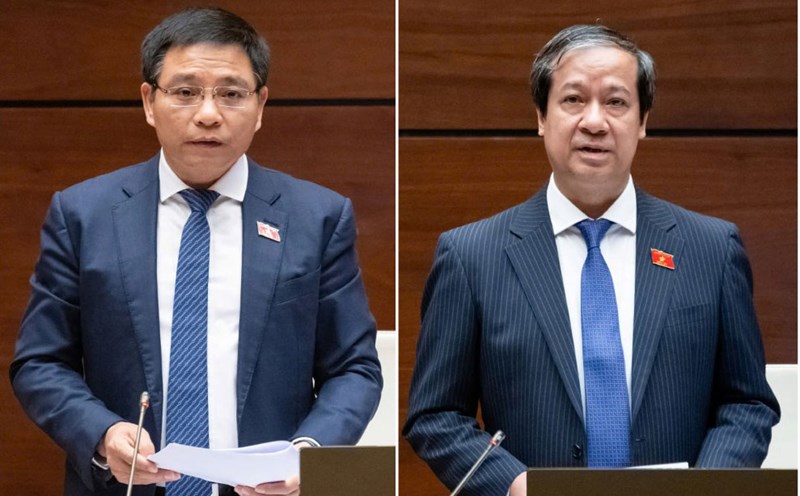9:30: Enterprises report losses of up to thousands of billions of VND, each facility sets a growth target of 8%
Citing the answer of delegate Khang Thi Mao about the Ministry of Finance's assignment of state-owned enterprises to achieve growth of 8% or more in 2025 to contribute to the overall growth of the country, delegate Ta Van Ha (Quang Nam Delegation) raised the issue: According to the report, in 2023, 134 state-owned enterprises will lose up to VND 115,270 billion, approximately nearly 5 billion USD. In the context of businesses facing many pressures and limitations within the Vietnamese economy, the complex and difficult situation of regional and geopolitical economies in the region and the world, in particular, the US applies a tax on Vietnamese goods imports of up to 46% - greatly affecting Vietnamese businesses. Request the Minister to clarify further, on what basis, on what basis and feasibility of assigning growth to enterprises to reach 8%?
9:15: Anti-counterfeit and counterfeit goods are a driving force to strengthen consumer confidence
Delegate Trieu The Hung (Hai Duong Delegation) asked whether domestic consumption is an important driving force to promote economic growth. Vietnam estimates that consumption contributes about 70% of GDP. Recently, domestic consumption growth has slowed down due to declining purchasing power and consumer confidence affected by trade fraud, counterfeit goods, poor quality goods...
The delegate asked what solutions does the financial sector have to sustainably develop domestic consumption as the main driving force to contribute to double-digit economic growth in the coming time that we have proposed and determined to implement?
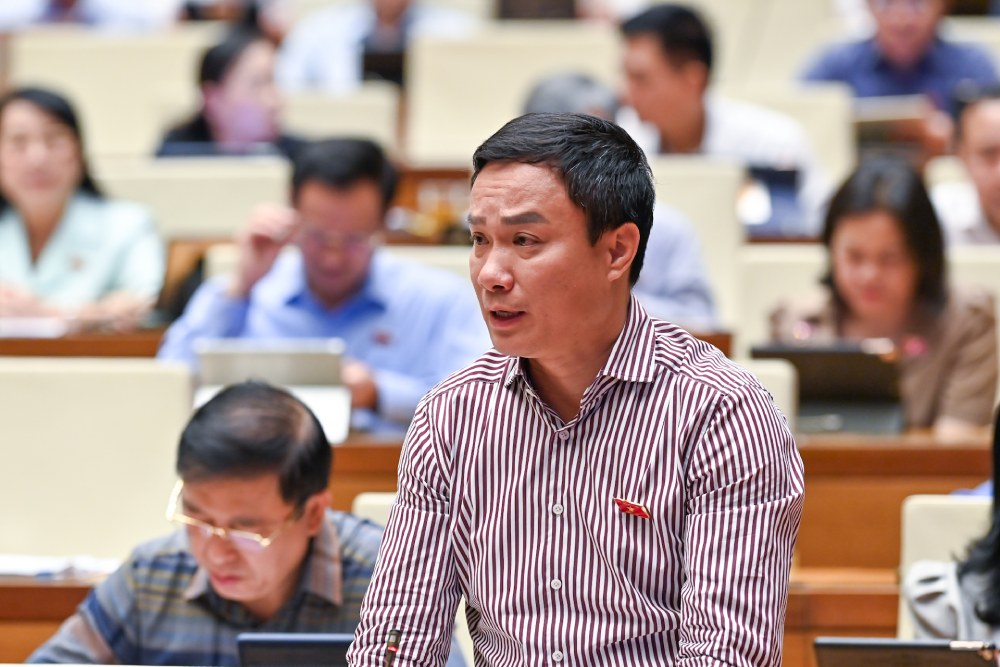
Responding to this issue, the Minister of Finance said that domestic consumption needs to be strongly promoted in the last months of the year, combined with other driving forces to contribute to socio-economic development. Currently, consumption has grown again at the same rate as before the COVID-19 pandemic.
In the first 5 months of 2025, consumer growth will be 9.7%. However, compared to the requirements and scenarios set out (12% or more), it has not been met. To promote consumption, it is necessary to combine fiscal and monetary policies, improve consumer confidence and develop a more efficient distribution system.
The Ministry of Finance coordinates with the Ministry of Industry and Trade, the State Bank, ministries, localities... to strengthen consumer confidence. Recently, the fight against counterfeit, counterfeit, and poor quality goods has been a driving force to strengthen consumer confidence.
Next, we must stabilize the macro economy, control inflation and exchange rates so that people limit their savings; have solutions, strengthen management to stabilize domestic commodity prices, especially during holidays and tourist season.
"If the price is cheap, the demand will be greater. Strengthen the prevention of smuggling, counterfeit goods, and origin fraud, the Minister proposed solutions.
An important solution proposed by the Minister is to increase people's income, continue to adjust public sector salaries, increase regional minimum wages, basic wages in accordance with labor productivity and inflation index. In particular, we have issued many resolutions and decrees on salary increases for cadres, civil servants, public employees, and senior experts. Adjust personal income tax in the direction of reducing the burden on people with average and low incomes. The Law on Personal Income Tax will be amended in the near future.
9:00 a.m.: Delegate Khang Thi Mao (Yen Bai Delegation): The Government has reported to the National Assembly to issue Resolution 192 setting a GDP growth target of 8% or more, creating a foundation for double-digit growth in the period of 2026-2030. Can you tell us what solutions for state-owned enterprises are needed to achieve the growth target of 8% and aim for double-digit growth?
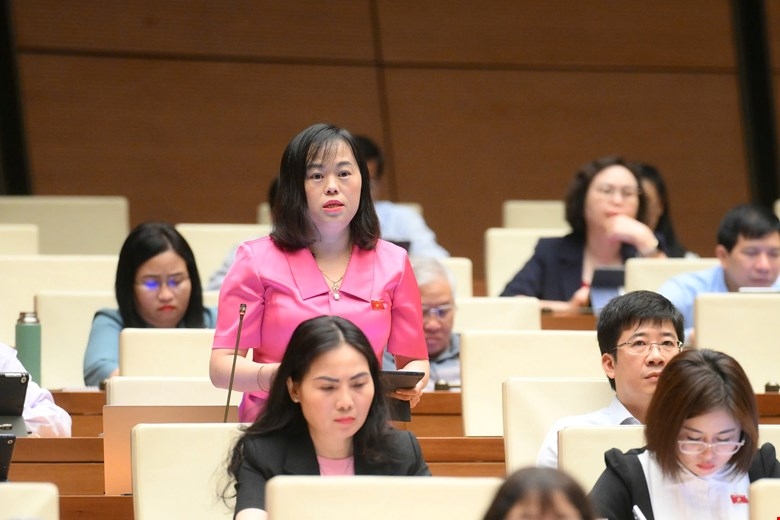
Responding to delegate Khang Thi Mao, Minister of Finance Nguyen Van Thang said: As the owner of 18 Groups and Corporations, the Ministry of Finance has recently developed growth targets.
First, we have asked corporations and companies to adjust their business plans, making the growth target of these enterprises also at least 8% or more.
Second, strongly reform and amend institutions associated with business activities such as: Amendment to Law 69, Law on Enterprises, Law on Investment, Law on Bidding, Tax Laws... with many measures to unlock resources and increase the efficiency of businesses.
However, as I have mentioned before, businesses must be proactive in innovating management and operation thinking, with the highest proactiveness, making the most of resources, especially capital to implement the most effective business strategy and focusing on investment, projects with strengths, core, not spreading...
Third, the State uses capital representatives to monitor business activities and provide timely support to businesses to overcome difficulties and challenges in the process of implementing set goals and plans.
8:49: People are not afraid to pay taxes, but are afraid of procedures and tax calculation methods
National Assembly delegate Hoang Van Cuong (Hanoi City Delegation): Resolution 68 on private economic development has set out one of the solutions to develop business households professionally, which is to eliminate turnover tax. Resolution 198 decides to eliminate contract tax for business households from January 1, 2026. This policy is affecting millions of business households with a fear mentality. Even in the discussion session in the hall, some delegates proposed to consider and postpone the application of this policy.
This shows that households are not afraid to pay taxes, but are afraid of calculating taxes and submitting procedures correctly. ask the Minister: What plans and solutions does the Government have for the implementation of the new tax collection policy after eliminating contract tax so that business households are more convenient and excited to pay taxes.
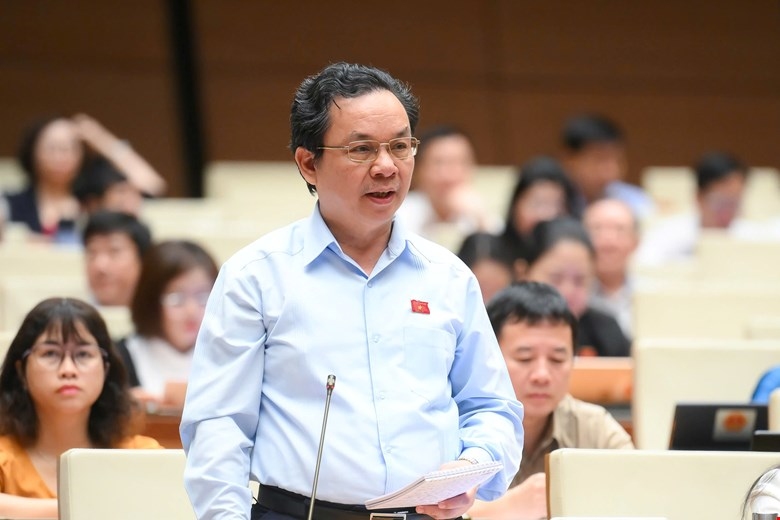
Minister of Finance: Currently, our tax system has been assessed by international agencies as basically approaching international practices. However, there is a problem related to the transparency of some types of taxes that are currently being collected manually - this is a major barrier leading to non-transparency in tax management.
Recently, Resolution 198 of the National Assembly and Resolution 68 of the Politburo required the removal of contract tax, no later than 2026.
Although the current tax mechanism has been suitable for a certain period, it has so far revealed many shortcomings, lack of transparency, and easy to abuse, causing inequality between business types, not creating motivation for business households to grow into small and medium-sized enterprises.
Theabolition of contract tax from 2026 is considered a correct policy of the State, a fundamental and necessary step to make the operations of business households transparent, create equality in tax regimes between business households and enterprises, promote the transition to the business model, and expand the formal economic sector.
This policy is truly a new process of implementation, reaching millions of business households. Therefore, we are preparing synchronously on legal and technological issues, supporting implementation, ensuring convenience, reducing the burden of procedures and costs for business households. Specifically: Review and improve tax policies. We are proposing to amend the Law on Tax Administration and the Law on Personal Income, towards a new tax management model, transparent and easy to implement.
Simplify books, invoices, and documents to ensure that business households are not pressured when switching to the enterprise model.
Strengthen digital transformation in tax management, such as applying electronic invoices generated from cash registers, helping to collect correctly and fully, while reducing time and costs for business households. Providing free electronic tax declaration and payment systems, electronic invoice software, accounting software, especially supporting businesses in difficulty in the early stages.
Promote internal digital transformation, improve the quality of public services and improve tax management capacity, enhance data connectivity.
Third, promote communication, training, and consulting, such as increasing propaganda and instructing business households to clearly understand the benefits and implementation of electronic invoices, tax declaration, organizing training, accounting consultation, and tax for business households.
Recently, mass media agencies have closely coordinated with the Ministry of Finance and tax authorities to propagate and guide business households on this issue.
8:43: Will use AI to prevent e-commerce tax loss
Delegate Nguyen Huu Thong (Binh Thuan Delegation) pointed out shortcomings in tax management for business activities on e-commerce platforms and social networks. According to the delegate, tax fraud in this field not only causes loss of state budget revenue but also creates an unfair competitive environment for traders, traditional business households and supermarkets and shopping centers.
The delegate suggested that the Minister inform the implementation of legal regulations on this issue and fundamental solutions to strengthen management of e-commerce activities in the coming time.
Minister of Finance Nguyen Van Thang has proposed many fundamental solutions to prevent tax losses from e-commerce. The Minister said that the financial sector has implemented tax management in the field of e-commerce very strongly and achieved encouraging initial results.
According to the Minister, key solutions include issuing regulations on electronic invoices and tax deduction responsibilities of e-commerce platforms. Individual business households can authorize the floor to create electronic invoices and identify personal sales numbers via social networks. Strongly apply information technology, even artificial intelligence (AI) to management, build electronic information portals to declare and pay taxes.
As a result, the Minister said that 95% of population databases have been standardized, connecting and sharing information with banks and websites on e-commerce.
The Minister said that 158 foreign suppliers have declared and paid taxes, earning VND23,000 billion. Along with that, 106,000 individual business households have declared and paid VND 1,200 billion in taxes via the electronic information portal. Tax revenue from e-commerce in the first 5 months of the year grew by 55% with an absolute amount of over VND 75,000 billion.
In the coming time, the Ministry of Finance will continue to improve regulations, clearly identify organizations and individuals doing e-commerce business; upgrade electronic portals and especially use AI to warn of tax fraud, review individuals with income arising from digital platforms.
8:35: Deploying policies to attract businesses to invest in mountainous areas
Delegate Au Thi Mai (Tuyen Quang province) raised the issue of what policies does the Government have to support and attract businesses to invest in mountainous areas and ethnic minority areas.
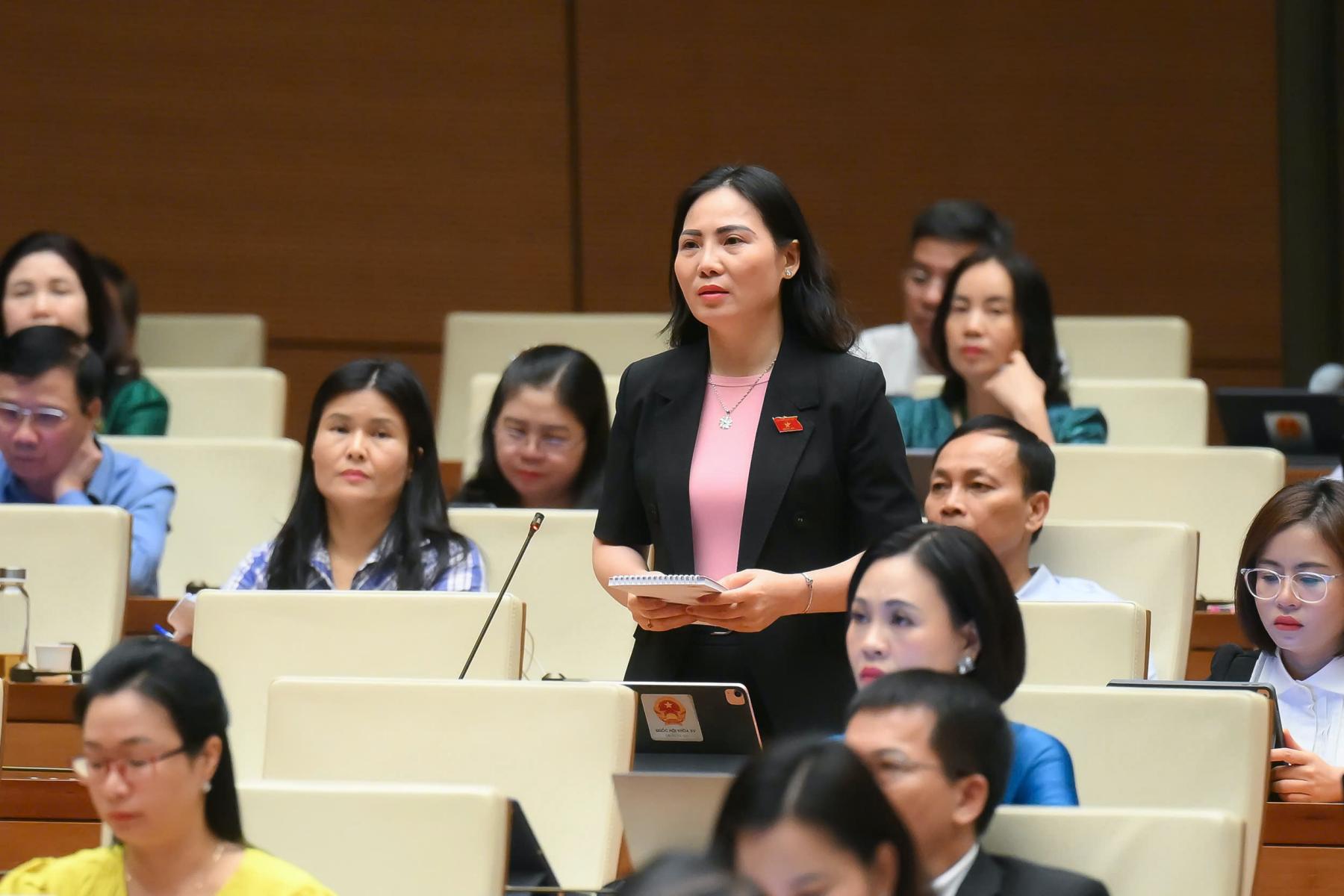
Regarding this issue, Minister Nguyen Van Thang said: The Party and State are very interested in promoting the development of enterprises in mountainous areas, remote areas, especially disadvantaged areas and enterprises owned by ethnic minorities, women, and people with disabilities to achieve the dual goal of both economic development and social stability.
The Ministry of Finance has also proactively integrated many preferential policies for businesses in disadvantaged areas and businesses owned by disadvantaged groups. Including tax exemption and reduction policies, incentives for projects implemented in disadvantaged areas, etc.
In the coming time, the Minister of Finance said that the Ministry will focus on 3 main groups of issues.
First, continue to improve the legal framework to be more favorable for businesses in disadvantaged areas and vulnerable groups to master.
Second is to promote the implementation of start-up support programs and market development consulting training for this group of businesses.
Third, closely coordinate with ministries, branches, localities, unions, and business associations to bring policies to the grassroots, to the right subjects, to the right needs, and at the right times.
Delegate Duong Tan Quan (Dong Nai province) raised the issue, Resolution No. 12 of the Central Committee clearly stated the limitations of state-owned enterprises as the core force of the state economy, leading to creating development conditions for the economy, which is the mechanism of state-owned enterprise governance that is slow to be innovated, ineffective, not in accordance with international practices and standards, and limited transparency.
The delegate suggested that the Minister provide solutions on innovating state-owned enterprise governance in accordance with international practices.
Regarding this issue, the Minister of Finance said that state-owned enterprises have further improved their role and management capacity to approach international governance. However, frankly admitting that the management capacity of state-owned enterprises has not yet been approached internationally from strategic thinking, leadership capacity... has not brought about efficiency.
Therefore, the Ministry of Finance has advised the Government to amend Law 69, helping state-owned enterprises have all the conditions to rise up and apply international standards.
The State has created a legal corridor, but businesses need to unify awareness, enhance the responsibility of equity representatives, enhance autonomy and self-responsibility, improve information and transparency, international cooperation, take advantage of scientific and technological advances, innovate recruitment, training and fostering staff...
8:30: Deploying many solutions to encourage private economy to participate in PPP projects
Delegate Dao Chi Nghia (Can Tho City Delegation) questioned: Currently, the Party and State have many policies to create conditions to promote and develop the private economy, especially encouraging strong economic sectors to participate in major projects of the country. What specific solutions will the Ministry of Finance have to advise the Government to encourage the private economy to participate in infrastructure and public service development projects in the coming time?
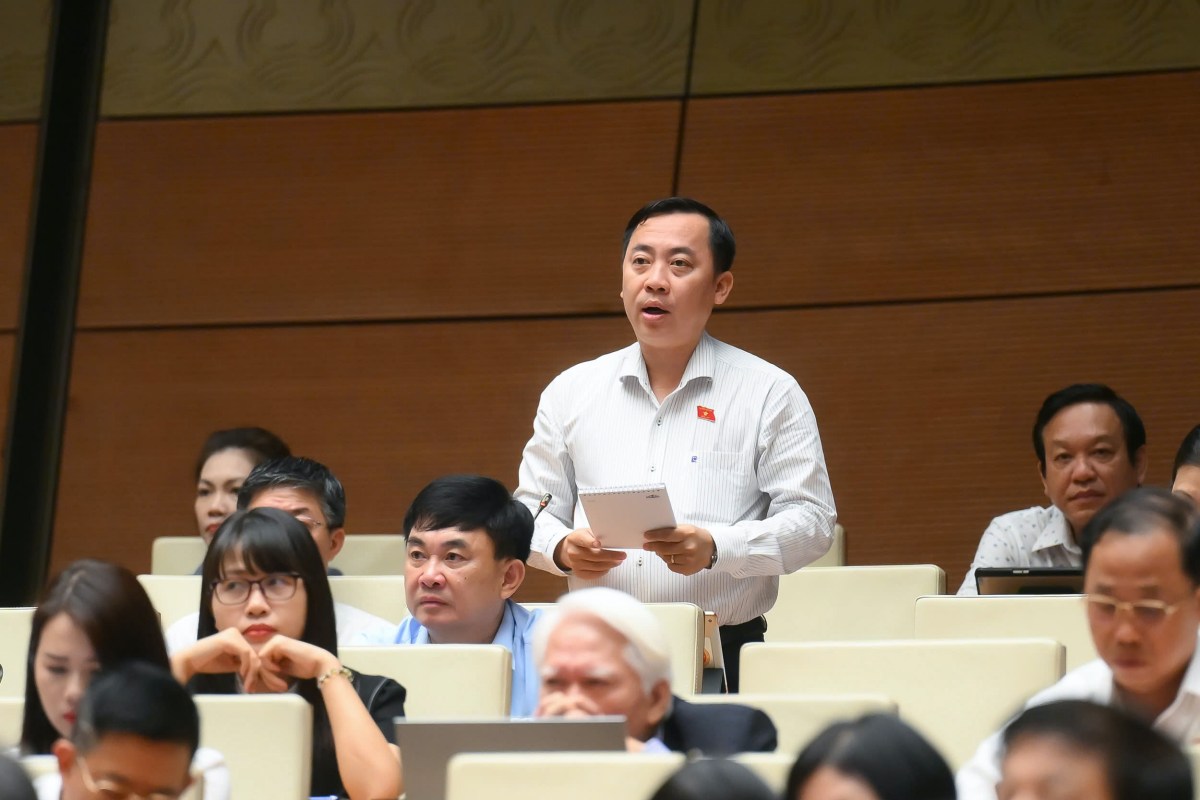
Minister of Finance Nguyen Van Thang: The Ministry of Finance has advised the Government to continue submitting to the National Assembly to amend the provisions of the Law on Investment under the public-private partnership (PPP) method.
Among them, there are noteworthy points: First, shorten the time for PPP project appraisal to the maximum, and cut down on investment policy procedures for some project groups.
Second, give the competent authority the initiative to decide whether or not to establish an appraisal Council. This helps reduce the time in procedures to implement PPP investment attraction.
Third, expand the cases of designating bids and special selections to meet specific requirements and new requirements when implementing key and urgent projects. This content is very important. Recently, the projects that the National Assembly has approved have finally had to go through bidding procedures while we have identified investors, which has taken a lot of time, even a year.
Fourth, simplify the requirements and criteria for evaluating investors to create conditions for investors to participate, diversify fields and forms of public investment cooperation so that businesses have more options, promote models such as public-use private investment, public-private investment, public-private management leaders.
Fifth, prioritize the allocation of state budget to prepare for investment, site clearance, risk sharing and balance resources to participate in key PPP projects. As recently, projects such as the North - South Expressway, Long Thanh Airport... have very new ways of doing things.
Previously, when businesses wanted to do PPP projects, they had to spend 100% of their capital to do it. However, many state-owned projects are currently participating, even participating 50, 60%.
Sixth, in the field of science and technology alone, the Ministry of Finance is drafting a Decree on PPP in the fields of science, technology and innovation, digital transformation. We expect to submit it to the Government for promulgation in June 2025.
Seventh, continue to actively remove difficulties for PPP projects under contracts between the state and enterprises to create trust for enterprises. This is an issue that the public and businesses are very interested in.
8:24: Many policies to effectively utilize land in industrial parks
Delegate Nguyen Van Danh (Binh Duong Delegation): Land is a special, limited resource of the country. This is an important resource for national development. Recently, the Party and the Government have issued many regulations to effectively manage, exploit and use this resource. However, currently, some clusters and industrial parks have been established, but have not been put into operation or put into operation, making it very difficult to attract secondary investors.
Meanwhile, some localities have good development conditions, attracting investors, and limiting land resources. ask the Minister: Are there specific solutions to effectively use this land resource for industrial park infrastructure, especially new-generation industrial park infrastructure?
In my opinion, we must thoroughly grasp the principle of not developing industrial parks at all costs.
Current regulations require provinces and cities to only open new industrial parks when the occupancy rate of existing industrial parks is at least 60% on average. This regulation aims to ensure the allocation of industrial parks, balance between regions, and avoid wasting land and infrastructure left abandoned in some places. At the same time, encourage localities with available advantages to switch to the environmentally friendly new-generation industrial park model.
We must flexibly institutionalize for areas with difficulties. Provinces with a total industrial park area of less than 1,000 hectares or industrial parks located in preferential areas, industrial parks in economic zones, new model industrial parks (culture, high technology, specialized industrial parks...) are exempted from taxes and 60% exemption to attract investment.
There have been many policies on developing industrial parks and effectively using land, specifically regulated in Laws, Decrees, and guiding documents on how to effectively use land in industrial parks.
8:20 a.m.
Delegate Tran Kim Yen (HCMC Delegation): The world has unpredictable fluctuations, especially the impacts of new tariff policies and geopolitical instability. International organizations have all lowered their global growth forecasts by 0.5 - 1%.
Vietnam sets a growth target of 8% or more. This is a big challenge, requiring high determination and new thinking. One of the solutions proposed by the Ministry of Finance is to unblock, effectively focus public investment sources, and strive for 100% disbursement. In recent times, despite great efforts from ministries, branches and localities, the public investment disbursement rate is low. People complained to God that they could not use their money. Want the Minister to tell us a more feasible solution to achieve the growth target of 8%?
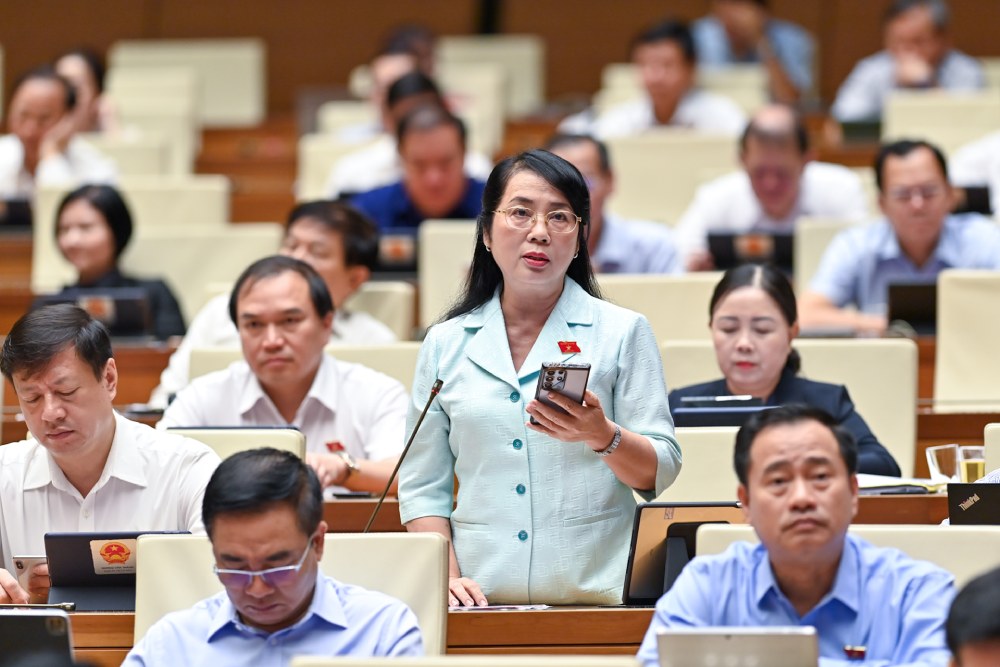
Minister Nguyen Van Thang: The Government's report stated that in the past 5 months, we have made every effort, led and directed, especially the Prime Minister has issued many telegrams and held many meetings. The results are not low. If compared to last year, we are better in the same period last year. Recently, the Prime Minister has identified these difficulties and issued many urgent telegrams and instructions.
Results for 5 months, the disbursement amount is approximately 200,000 billion VND. The disbursement rate reached 24.1% of the plan - higher than in 2024 (about 22%). Fortunately, all key national dune projects have met/exceeded the schedule.
Currently, we set a target of disbursing 100% of public investment capital, thereby contributing to economic growth, with a growth target of 8%. This is a very challenging goal. Last year we reached approximately 92%. To come up with the right solution, we identified difficulties and problems, and paid the full amount.
Obviously, the disbursement characteristics are often low at the beginning of the year. Public investment includes many stages, and one stage is stuck, affecting the entire transmission line. Subjective reasons (mainly): Poor preparation of the capital system, lacking legal system, overlapping problems, lack of raw material supply, and problems with the capacity to organize implementation of relevant parties, especially some localities and management boards, have not met requirements.
Solutions:
- Focus on removing legal obstacles in public investment in land, planning, and administrative procedures. In this content, the Government has also submitted to the National Assembly to amend the law on public investment in the direction of more decentralization and delegation of authority. The Prime Minister assigned responsibility to each ministry and locality to remove difficulties and obstacles.
- Determining the disbursement results as an important basis for evaluating the classification of task completion levels in 2025 for collectives and individuals.
- Continue to organize the work of the steering committee, review and remove difficulties and obstacles, especially key projects.
8:17: 3 solutions to realize the target of 2 million enterprises by 2030
Delegate Dang Bich Ngoc (Hoa Binh Delegation) asked the Minister: In the context of many difficulties in the domestic and international markets. In the country, the number of enterprises withdrawing from the market has increased, production activities are still facing many difficulties, creating more pressure with the goal of reaching 2 million enterprises operating in the spirit of Resolution 68 by 2030. As the commander of the industry, what solutions does the Minister have to realize the goal of developing enterprises in both quantity and quality in the coming period?
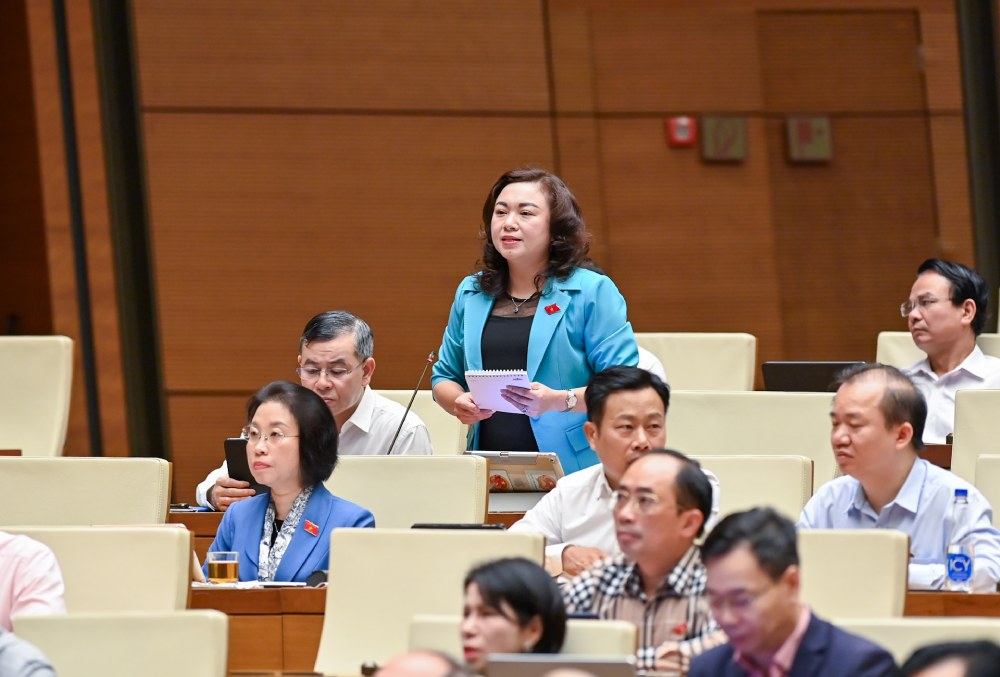
Minister of Finance Nguyen Van Thang: The target of reaching 2 million enterprises by 2030 was set out in Resolution 68 of the Politburo, the National Assembly also issued a resolution for implementation. This is an important goal in socio-economic development, demonstrating the desire for strong development - but a big challenge in the context of difficulties and challenges.
The competitiveness of many businesses is still weak, requiring high determination and drastic action. In the first 5 months of the year, the number of enterprises withdrawing from the market is large.
There are 3 groups of solutions that need attention: First, create a favorable, transparent and effective business environment. Focus on removing barriers to entry and exit, and move in the market. We must substantially reduce administrative procedures, reduce compliance costs, and reform conditions of interest. We must review and remove investment, in land, construction, planning, create an open and stable corridor, so that businesses have conditions and motivation to participate. With the current trend, we must also promote digital transformation in management to create the most favorable conditions along with reforming administrative procedures for businesses.
Second, strongly promote the process of converting business households to enterprises. Currently, we have more than 5 million business households. This is the force with the largest potential to realize the goal of 2 million enterprises. We are reviewing and creating a legal framework, shortening the gap between business households and enterprises in terms of governance, finance, accounting, and canceling contracts from 2026. Promote transparency and professionalism. At the same time, there are practical support policies: 3-year income tax exemption, card tax, providing free accounting platforms and software to improve business capacity.
Solution 3, improving competitiveness for businesses, prioritizing land support, capital accumulation, digital transformation, resource development, focusing on unblocking bottlenecks to support businesses to increase resilience, thereby reducing the number of businesses withdrawing from the market.
On the morning of June 19, continuing the 9th Session, Politburo member and National Assembly Chairman Tran Thanh Man delivered the opening speech of the question-and-answer session.
The National Assembly Chairman said that based on the synthesis of socio-economic issues that were of great concern to voters and people, National Assembly deputies selected two groups of issues for the National Assembly to conduct questioning, under the responsibility of two Ministers: the Minister of Finance and the Minister of Education and Training.
Also participating in the explanation were Deputy Prime Ministers in charge of the sector and relevant Ministers and heads of sectors. Permanent Deputy Prime Minister Nguyen Hoa Binh will, on behalf of the Government, clarify issues related to the Government's management and directly answer questions from National Assembly deputies at the end of the questioning session.
The National Assembly will vote to pass the Resolution on questioning at the end of the session as a basis for agencies to implement and for the National Assembly, the National Assembly Standing Committee, National Assembly agencies, National Assembly delegations, and National Assembly deputies to supervise.
Through the questioning of National Assembly deputies, Ministers and heads of sectors will have more information to perfect effective solutions, improve the quality of direction and management, and create strong changes in each management area.
Implementing the National Assembly Session Regulations, the questioning session at this Session continues to be conducted in a "quick and concise" manner, with respondents having no more than 5 minutes to speak on issues in the field of questioning before the National Assembly conducts questioning.
At the discussion session on socio-economics on June 17 and 18, the Minister of Finance explained a number of contents related to the field of questioning, suggesting that delegates avoid repeating the content, and only ask the question again if necessary.
According to the National Assembly Chairman, the 9th Session is taking place with a determined, innovative spirit, a very high sense of responsibility of the National Assembly, the Government and relevant agencies.
The session was followed by voters and people, with excitement, agreement, and special expectations for the implementation of the merger of provincial-level administrative units (provincial mergers), the reorganization of administrative units, and the construction of a two-level local government organization.
At the same time, institutionalize and implement the Party's policies, especially the 4 important Resolutions of the Politburo, which are considered "four pillars", creating a strong driving force to bring our country into a new era - the era of development, prosperity and strength of the nation.
In that spirit, the National Assembly Chairman suggested objectively and carefully assessing the results and achievements, difficulties, challenges, and opportunities. Analyze correctly, in depth and give advice, propose breakthrough solutions and tasks, close to reality, feasible, highly effective, meeting the requirements of rapid and sustainable development of the country in the new period.
The National Assembly Chairman believes that with high intelligence and responsibility, National Assembly deputies and Government members will create a vibrant and successful question and answer session.
Thereby contributing to making the questioning activity an increasingly important highlight of the session, meeting the expectations of voters, people and National Assembly deputies themselves.



